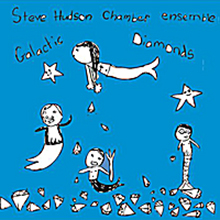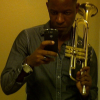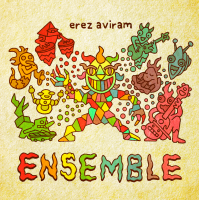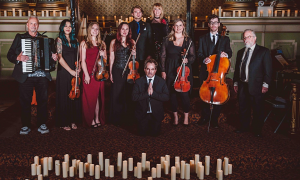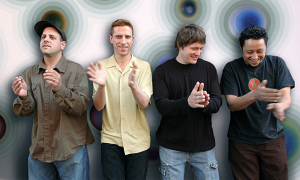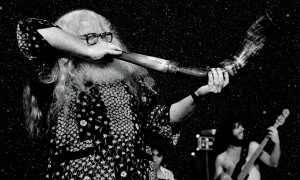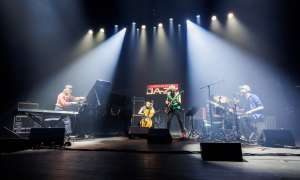Home » Jazz Articles » From the Inside Out » Voices Instrumental in Jazz
Voices Instrumental in Jazz
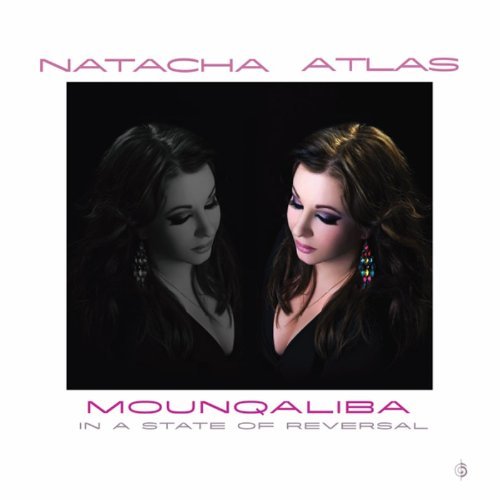
Natacha Atlas
Mounqaliba
Six Degrees Records
2010
Vocalist Natacha Atlas seems to embody the modern musical millennia: She was born in Brussels and raised in one of its Moroccan suburbs; her compositions and singing reach into and crisscross storied European and Arabic musical traditions. Primarily co-written and performed with multi-instrumentalist Samy Bishai along with pianist Zoe Rahman, a chamber orchestra and 20-piece Turkish ensemble, Mounqaliba is most likely the clearest representation of Atlas' ambitious vision so far. "What I hope I have achieved is to match the lyricism of classical music with the inherent poetry of Arabic," she says, "through the juxtaposition of western classical string sections with traditional Arabic instruments, classical Arabic poetry against abstract impressionism, traditional Arabic percussion with smoky jazz kits..."
The strings, percussion and other instrumentation—especially Rahman's unaccompanied and gorgeous "Bada Al Fajr" solo—prove quite complementary and evocative, but Atlas' voice dominates their colorful landscape with a sound that's simply magic and is both timeless and modern. Her voice curtsies to, then dances with, the twirling strings of the Arabic traditional "Muwashah Ozkourini," to call the instrumentation together beneath its wings, then swims in Arabic harmonic and melodic pools more than four centuries deep. Atlas directly juxtaposes this Arabic traditional against her hypnotic treatment of Nick Drake's somber elegy "Riverman."
"Riverman" flows into another pool of churning modern and ancient streams: "Batkallim," a swirling undertow of hip-hop and traditional Arabic rhythm that sputters and loops back into itself, rising and falling beneath her singing as she surfs its surface, then speared through by Rahman's thunderous piano and convulsing to full stop. Her piano introduction to the title track emerges as the ghost of these closing chords, a regal fluted melody ornamented by layers of strings and vocals that float down within the arrangement. "Mounqaliba" beautifully realizes Atlas' ambition of harmonizing the frameworks of Arabic and European classical music.
She also updates the wedding folksong "Taalet" with her "back for the future" aesthetic, and swirls the hip-hop beat and string arrangement into "La Nui test Sur La Ville" (from the repertoire of French chanteuse Francoise Hardy) like thick cream into dark black coffee. Atlas' steamy, moaning vocalese that closes "Sur La Ville" transcends the differences between European and Arabic languages because it uses no language at all, and accomplishes without words the ambitions of her music.
Authentic field recordings from Marrakesh, Cairo and elsewhere, along with snippets of psychological discussion of free will, also serve as mileposts on this remarkably programmed journey through Mounqaliba.

Chet Baker
She Was Too Good To Me
CTI Masterworks
2010
Newly reminted in 2010's CTI Masterworks series, She Was Too Good To Me was originally Chet Baker's 1974 "comeback album," his first recording since a well-publicized mugging by junkie acquaintances (hardly "friends") that relieved the singer and trumpet player of his money, dope and most of his teeth. "Believe me," Baker once observed, "when a trumpet player has his teeth pulled, it's a comeback."
Creed Taylor's velvety production proves the perfect setting, and the standards "Autumn Leaves" and "Tangerine" prove that Paul Desmond's dry and airy alto saxophone is the perfect instrumental foil for Baker's tropical (steamy and lush) trumpet and vocal romanticism. Don Sebesky's arrangement tailors "Autumn Leaves" toward the poignant and melancholy, darker shades of Baker's trumpet, and shapes them as emotional counterweight to the more cerebral, crystalline sounds of Desmond's alto and Bob James' electric piano, all within a rhythm that seems to both float and swing. Baker's solos in "Tangerine" seem to neatly meet the ballad styles of Miles Davis and Freddie Hubbard halfway, while bassist Ron Carter moves its rhythm with stealthy, cool funk.
Taylor's production and James' keyboard also polish Hank Mobley's cool melody "Funk in Deep Freeze," equal parts bop and blues, to an icy sheen beneath Baker's trumpet, tethered between walking in space and walking the blues. In "It's You or No One," Baker's trumpet jumps and pops.
Just like "Autumn Leaves" plays to his trumpet, the palpable longing of "She Was Too Good To Me" seems so appropriate for Baker's vocal delivery—worn and weary, singing just as much to himself as to you, lingering almost too long on each word and thought. His vocal phrasing—the way he ends a verse to blend in with the beginning of the next, for example—aches like singer Frank Sinatra in a blue mood, which is to say it is sheer vocal genius. In the closing, wistful "My Future Just Passed," Baker's voice and trumpet both sound so happy to be so sad.
It is irresistible to wonder if the closing, wistful "My Future Just Passed" might also have been Baker's own commentary on the potential that his sometimes dissolute life left unfulfilled.
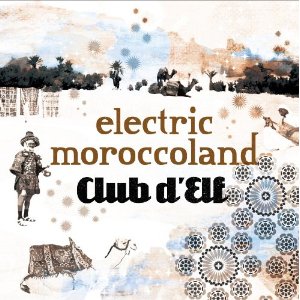
Club d'Elf
Electric Moroccoland / So Below
Face Pelt Records
2011
Even in our far-reaching and cluttered modern musical culture, it seems safe to suggest that there is no other band quite like Club d'Elf, a floating riverboat gamble with a fluid cast of contributors—keyboardist John Medeski, guitarists Reeves Gabrels and Duke Levin, Mat Maneri on electric viola, turntablist Mister Rourke, and many others among them—steered by bassist Mike Rivard and Rivard's longtime co-explorer, multi-instrumentalist and musicologist Brahim Fribgane.
Electric Moroccoland, the first disc in the new two-CD package, is primarily informed and inspired by Rivard's devotion to the rich musical heritage of Morocco and the region's three-stringed, camel-skinned sintir (their version of the bass) and oud (an Arabic lute). "The crux of Moroccan music is trance," Rivard has explained. "Trance as a quality in music has always attracted me, whether it's an extended James Brown cut, or something by Fela [Kuti] or Steve Reich. I've always sought out music that allows you to forget where and who you are and to break free from the mind's constant chatter." When Rivard speaks of the beauty of trance, the contemplative (but not peaceful), repetitive deep grooves of "Ambib" and "Instar" from Electric Moroccoland back up his talk.
After "Sand," a freewheeling space-rock jam dedicated to the late Mark Sandman, Rivard's friend and leader of the underground band Morphine, the band twirls into "Ghir Khoudouni," a double-decker sandwich of liberating chant and mesmerizing jam. "Sidi Rabi" transports you into a scorching, sandy desert that bursts into vibrant music and sound. Rivard creates an authentic Arabic rhythm simply by moving the "one" closer to the "three," and leads a throbbing, tumultuous jam that pulls blues power out from Middle Eastern music through his bass line.
By similarly keeping the same bass notes but rearranging their respective beats, Rivard reshapes "Sunshine of Your Love" into a Moroccan blues and yet retains just enough of the framework so your ears can track back to Cream's original blues-rock classic, too.
The funky organ and guitar jam "Bendir Done That" steers Electric Moroccoland in the direction of small organ/guitar combo rhythm and blues that grows in mass and complexity as Club d'Elf's cadre of companion instruments climbs on board and yet retains the sound of guitarist Steve Cropper and organist Booker T. Jones jamming, thrusting and parrying, in space, floating untethered to earthy Memphis, as its core.
So Below offers an alternate journey to a lush, fused trip-hop and rock, psychedelic jungle, especially its eleven minute title track, a musical beehive with bass, electronics, and percussion buzzing in every direction. It also demonstrates blues and trance influences, but much differently from Moroccoland.
"I Wish I Was in Heaven Sitting Down" carves up backwoods gutbucket blues with wicked slide guitar, and crackles from its country twang and edgy, nervous blue vocal; Rivard hammers the repetitive bass line into a pulsating vamp, and tosses then serves it all in a syrupy psychedelic mix: alt-rock jam-band country-blues. Its foundational guitar riff gives "As Above" an electric blues sound, too, which quite mischievously frames the dialogue between turntablist DJ Logic, pianist Medeski and Dolsi-naa Abubakari Lunna, a master drummer from Ghana.
Parts one and two of "Trace Meeting" swing from Rivard's bass fulcrum and play back into his trance-fixiation. Staccato drums establish the beat, but almost none of the other instruments sound tied to it, especially the keyboards that wriggle into corners of Chick Corea complexity, and horns that sporadically whiz past like onrushing traffic.
"Our music is about surrender and giving into something more powerful than one's self, and, as corny as it sounds, really feeling love for your brothers," Rivard once said. "Certainly life is a lot more complicated than the simple ways of us musicians, but if our little musical brotherhood can embrace different beliefs, then maybe it's possible for such cooperation to exist in society at large."
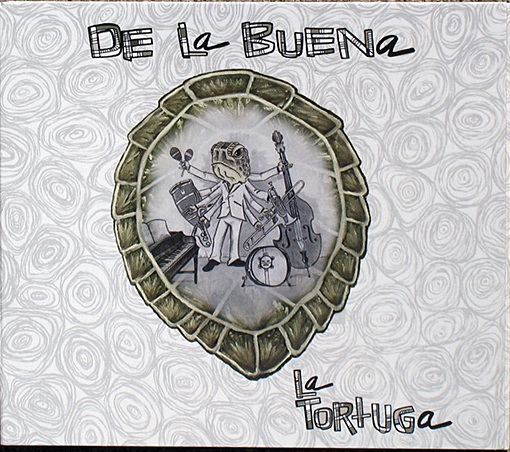
De La Buena
La Tortuga
Self Released
2011
When you consider what would be the animal kingdom's equivalent of hot, lusty Latin jazz, the first animal you think of is most likely not the turtle. At least not until you hear this first studio album by De La Buena, La Tortuga (the turtle).
Milwaukee Wisconsin's reigning masters of Latin and Afro-Cuban jazz, funk and groove, De La Buena shares several members with the retro-soul ensemble Kings Go Forth, including De La Buena co-founders Andy Noble (bass and arrangements), Cecilio Negron Jr. (congas and vocals) and keyboardist/composer David Wake. Wake, whose other credits include work with the inscrutable Lee "Scratch" Perry, wrote, arranged, and co-produced La Tortuga, which was recorded live in the studio and crackles with the energy of a passionate stage performance.
"Señassin" opens with a rippling pool of percussion into which the other instruments quickly splash; Eric Jacobson's trumpet solo scrapes the stratosphere with rockets that sound blasted from Arturo Sandoval's launching pad, while the other horns' arrangement swings with the weighty funk pendulum of Mongo Santamaria's classic "Afro Blue." Except maybe with not so much "Afro," but that comes in through the following tune, the traditional Yoruba chant "Sambaji."
Vocal chants, singing horns, and humming percussion assemble into "Imbe" like an Afro-Cuban army on the march. The middle of Wake's arrangement drops out all the instruments except the horns to conjure a different musical spirit: Three or four different horn lines all sing out then come together in the joyous communion of collective New Orleans improvisation, and then bring the entire ensemble roaring back in to close.
La Tortuga ends with even more of a vengeance. "Pelotas Blue" cooks together Latin boogaloo and Afro-Cuban rhythms into one rocking beat, stoked by hot trumpet (Jamie Briewick) and baritone sax (Mike Pauers) jazz solos. This erupts into the Latin sing-along party jam "Quimbombo," which is introduced by a child's giggling voice and closes in an inspired, climactic descarga that transcends all its different genetic threads to ring out the sound of pure musical joy. Wake takes his only piano solo of the set, a man dually possessed by the spirits of Eddie Palmieri and Ray Charles, in between.
With "Dezdenali," De La Buena closes by bowing toward the dance music of Machito and other Latin bandleaders, an important foundation of modern Latin music, and ends this roadrunner La Tortuga with a big band Latin bang.
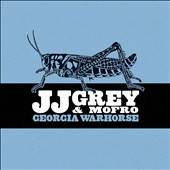
JJ Grey & Mofro
Georgia Warhorse
Alligator Records
2010
JJ Grey's eleven new tunes for Georgia Warhorse, named for the notoriously resilient Southern lubber grasshopper, reflect and broadcast his love for the rustic Florida backwoods where Grey and his family have lived for generations. Grey not only wrote all the tunes but played just about every instrument, except for the slide guitar that Derek Trucks (like Grey, a Jacksonville native) slices and dices into the closing "Lullaby," and sang all the vocals except for one duet.
From start to finish, Grey & Mofro barbeque meaty slabs of steaming hot blues, rock and funk. They cook from the opening "Diyo Dayo" due to Grey's wickedly barbed guitar hook and vocal that sounds equal parts thick as molasses Southern drawl and urban street rat snarl. And they keep the music cooking all the way through "The Hottest Spot in Hell," a diatribe that scalds pimps, slave owners and other men who abuse women, highlighted by a voicebox guitar solo and a climactic guitar rampage that crunches its chords into flat sheets of metallic sound.
In between, you'll find all the ferocious and tender beauty of Grey's beloved Florida natural everglades. Contemplations of nature in "King Hummingbird" and "Beautiful World" consider the reflection of his own place within this natural world; "Gotta Know," an old-sounding gospel blues dirge, also sings to nature as part of this dialogue. Musically, "Gotta Know" illustrates how successfully bands like the The Rolling Stones wove classic blues into contemporary rock threads; lyrically, "I finally understand/ It can't be understood" presents a man maturing down his own path to wisdom.
In an industry full of sexual metaphors, few have sounded more juicy and delicious than "Ya sweet as a mango and steamy like the Congo" from Grey's sensuous "Slow, Hot & Sweaty," a torrid groove that lays down your stroking rhythm.
The title track is one monstrous electric blues with bad intentions. On its surface, a tribute to an insect that's difficult to kill; at its core, a tribute to a way of life and place for living that seems to endure despite constant flurries of manmade and natural tragedies.
Singing out in a different voice emanating from the American south, "The Sweetest Thing" sounds like classic Stax Records from the label's Memphis soul peak, a hearty vocal duet between Grey and reggae icon Toots Hibbert. "Toots is the greatest soul singer I've ever heard and one of my biggest influences," Grey explains.
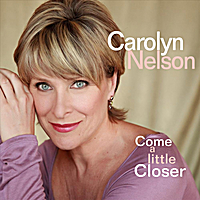
Carolyn Nelson
Come A Little Closer
Self Produced
2010
Carolyn Nelson has one of those voices that might lead you to think you've heard her sing before. And you might have: although Come A Little Closer is her solo debut, Nelson has performed throughout the US and Canada plus two tours of Spain (she can sing in five languages), has appeared on the daytime TV drama One Life To Live and in front of a big band at the Rainbow Room in NYC, plus too many background vocal sessions and commercials to recount.
Nelson draws bedrock support from pianist Steve Rudolph, bassist Steve Varner and drummer Erik Johnson, with guests including guitarist Paul Bollenback and percussionist Doc Gibbs. Bollenback displays considerable jazz chops, having previously recorded and performed with the likes of guitarist Charlie Byrd and saxophonist Stanley Turrentine; percussionist Gibbs' resume includes sessions with bassist Charles Fambrough, pianist Bob James and singer Erykah Badu.
Nelson brings it with jazz chops, too. She bravely calls her first tune, "I Don't Know Enough About You," from the Peggy Lee songbook (co-written with David Barbour, Lee's guitarist husband) and impeccably sings it undeterred by Lee's imposing legacy. Next, she pulls the dark shadows out from Cole Porter's brilliant "It's All Right With Me," flattening some notes, stretching out others, to make it sound sad and blue. Nelson just sings this so well: she toys with the phrase "it's all right" like a kitten's ball of yarn, and then leaves it hanging unresolved, the opening for Rudolph's piano solo to enter. Later, she polishes Porter's peppy "Just One of Those Things" with all the brightness of Rosemary Clooney.
In the rollicking "Hyde Side Blues," Bollenback and Rudolph roll out the blues carpet for Nelson's plea toward a gentleman who insists on behaving just a little too gentlemanly! Her rhythmically playful delivery and Brazilian percussion make Jon Hendricks' lyrics to the samba "O Pato (The Duck)," about waterfowl learning to dance, sound even more fun. Nelson's triumphant romp through Hendricks' vocal arrangement for Miles Davis' "Four," in tandem with vocalists Paul Jost and Wendy Simon, provides her tour-de-force for Come a Little Closer.
If a bubbling mountain spring, so crystal brilliant that it nearly blinds you, spoke in a human voice, it would probably sound much like Carolyn Nelson's. Crisp and pure, and refreshingly beautiful.

Peter Schärli Trio featuring Ithamara Koorax
O Grande Amor
TCB Records
2010
Their pairing may seem like an odd mix: Ithamara Koorax, born in steamy Rio de Janiero and expert voice for all the lusty and romantic musical treasures of Brazil, teaming with trumpeter Peter Schärli from Switzerland, where modern jazz often assumes a more astringent and ascetic (and often quite electronic) tone. Pianist Hans-Peter Pfammatter and bassist Thomas Dürst, who complete the Schärli Trio, are also Swiss. And yet their combination of tropical heat and frosty chill have already created—on The Peter Schärli Trio Featuring Ithamara Koorax: Obrigado Dom Um Romao (TCB, 2009)—and on O Grande Amor continues to create transcendent jazz that is beautiful for every language and region.
Pfammatter introduces the opening reflection on Antonio Carlos Jobim's "Fotografia" so tenderly that he seems to reincarnate Bill Evans, a helpful supplicant for Koorax as she caresses the lyrics, tenderly wrapping and delivering each note like a precious newborn. Speaking of Evans, Schärli's mid-song break echoes Miles Davis' profound ballad style, concentrating on the song's tonal core, modulating softly, and playing more a mood than a melody.
Ivan Lins' pensive "Setembro" simultaneously sounds like a broken-hearted lovesong and reverent church hymn, with Schärli's trumpet passage so sad and melancholy and yet so beautiful, like the French horns in a Burt Bacharach-Hal David classic. The way their respective singing and trumpet voices harmonize on the closing melody to "Setembro"—and later, as these voices intertwine to grow "Para Machucar Meu Coracao" like a creeping rose vine—is just so beautifully musical.
The title track, a stately arrangement of a tune co-written by Jobim and Vinicus de Moreas, leaves ample room for vocal and instrumental verses, and is unquestionably the highlight of this set. Just catch the first few words of Koorax's opening verse to become transfixed by her breathless romanticism, while Schärli again plays in a compressed harmonic range with explosive emotional power. Perhaps there's an easier way to describe it, but if Barbara Streisand ever went into a recording studio with Michel Legrand and Miles Davis, "O Grande Amor" is what might have come out. It is simply stunning and spectacular.
Pfammatter and Dürst provide such strong and sure rhythm support that you might not ever notice there's no drummer, but you'll surely notice how beautifully and delicately O Grande Amor flows and floats.
Tracks and Personnel:
Mounqaliba
Tracks: Intro; Makaan; Matrah Interlude; Bada Al Fajr; Muwashah Ozkourini; Riverman; Batkallim; Mounqaliba; Le Cor, Le Vent; Direct Solutions Interlude; Lahazat Nashwa; La Nui test Sur La Ville; Fresco's Interlude; Ghoroub; Evening Interlude; Taalet; Egypt Interlude; Nafourat El Anwar.
Personnel: Natacha Atlas: lead and background vocals; Louai Alhenawi: ney, background vocals; Joseph Aquilina: background vocals; Samy Bishai: beats, piano, programming, viola, violin, background vocals; Ian Burdge: cello; Paul Castle: background vocals; Mandy Drummond: viola; Eser Ebcin: accordion, qanoun, background vocals; Julian Ferraretto: violin; Vince Green: viola; Andy Hamill: chromatic harmonica, double bass; Ivan Hussey: cello; Pat Illingworth: drums; Danny Keane: cello; Kemper String Orchestra of Istanbul: strings; Oll Langford: viola; Martin Lissola: violin; Jennymay Logan: violin; Gillian Maguire: violin; Alcyona: piano; Aly El Minyawi: percussion, background vocals; Jocelyn Pook: viola; Zoe Rahman: piano; Emma Smith: violin.
She Was Too Good To Me
Tracks: Autumn Leaves; She Was Too Good To Me; Funk in Deep Freeze; Tangerine; With a Song in My Heart; What'll I Do: It's You Or No One; My Future Just Passed.
Personnel: Chet Baker: trumpet, vocals; Paul Desmond: alto saxophone; Bob James: electric piano; Ron Carter: bass; Jack DeJohnette: drums; Steve Gadd: drums; David Friedman: vibes; Hubert Laws: flute, alto flute; Romeo Penque: flute, clarinet; Lewis Eley: violin; Max Ellen: violin; Barry Finclair: violin; Paul Gershman: violin; Harry Glickman: violin; Emanuel Green: violin; Harold Kohon: violin; David Nadien: violin; Herbert Sorkin: violin; Warren Lash: cello; Jesse Levy: cello; George Ricci: cello; Don Sebesky: arranger, conductor.
Electric Moroccoland
Tracks: Overture; Sand; Ghir Khoudouni; Madrecita; Sunshine Of Your Love; Scorpionic; Mogador; Bendir Done That; Berber Song; Sidi Rabi; Ambib; Instar; Rope On Fire.
Personnel: John Medeski: Wurlitzer electric piano, organ, Mellotron, piano, clavinet; Mike Rivard: sintir, double bass, electric bass, handclaps; Brahim Fribgane: oud, resonator guitar, dumbek, bendir, karakab, tarija, cajon, handclaps; Erik Kerr: drums; Mister Rourke: turntables; David Tronzo: slide guitar; Geoff Scott: rhythm guitar; Duke Levine: guitars; Randy Roos: guitars; Alain Mallet: accordion, synthesizer; Mat Maneri: electric viola; Kousmat Mohammed: tarija; Dean Johnston: drums; Matt Kilmer: percussion; Hassan Hakmoun: vocals; Lotfi Tiken: vocals.
So Below
Tracks: Gettin' Squinty; Middle Pillar; So Below; Salvia; I Wish I Was In Heaven Sitting Down; Trance Meeting Pt.1; Trance Meeting Pt.2; As Above; End Of Firpo; Pharoah; Propeller; Taint Too.
Personnel: John Medeski: Wurlitzer electric piano, analog synthesizer, Moog, clavinet, Rhodes, organ, piano; Mike Rivard: sintir, acoustic bass, electric bass, tamboura, prepared bass, claps; Erik Kerr: drums; Scott Craggs: ambient guitar; Reeves Gabrels: guitar; Duke Levin: slide guitar, 12-string guitar; Randy Roos: electric guitar, resonator guitar; Gerry Leonard: guitar; David Johnston: vocals and guitar; Mat Maneri: electric viola; Allan Chase: alto saxophone; Tom Hall: tenor saxophone, baritone saxophone; Joel Springer: tenor saxophone; Dana Colley: electric baritone saxophone; Joe Maneri: tenor saxophone; Eric Hipp: tenor saxophone; Tom Halter: trumpet; Tommy Benedetti: drums; Dave Mattacks: drums; J. Hilt: drums; Brahim Fribgane: karakab; Dolsi-naa Abubakari Lunna: lunga; Matt Kilmer: percussion; Mister Rourke: turntables; DJ Logic: turntables; others.
La Tortuga
Tracks: Shagu; Señassin; Sambaji; Lessimes; Imbe; Playtime; I Kana Kélé Ké; Pelotas Blue; Quimbombo; Dezdenali.
Personnel: Julio Pabon: congas, bongos, timbales, percussion, vocals, cuica; Cecilio Negron, Jr.: congas, bongos, timbales, percussion, vocals; David Wake: piano, organ, keyboards, vibraphone, percussion, coro, musical director; Aaron Gardner: tenor saxophone, flute, block, shaker; Mike Pauers: baritone saxophone, tenor saxophone, flute; Eric Jacobson: trumpet, electric trumpet; Jamie Briewick: trumpet; Max Day: trombone; Jeremy Kuzniar: drums, percussion; Andy Noble: bass; Roman Edirisinghe: guitar, coro; Holly Wake: flute; Matthew Wilson: guitar; Carlos Adames: coro, vocals; Jahmes Tony Finlayson: conch shells; Matthew Turner: block, shaker; Tejumola Ologboni: voice; Yaya Kambaye: Kora.
Georgia Warhorse
Tracks: Diyo Dayo; King Hummingbird; The Sweetest Thing; All; Georgia Warhorse; Gotta Know; Hide & Seek; Beautiful World; Slow, Hot & Sweaty; The Hottest Spot in Hell; Lullaby.
Personnel: JJ Grey: Lead vocals, backing vocals, lead guitar, rhythm guitar, acoustic guitar, piano, synthesizer, clavinet, talkbox, harmonica; Anthony Cole: drums; Andrew Trube: bass, lap steel guitar, acoustic guitar; Anthony Farrell: Rhodes, piano; Art Edmaiston: tenor saxophone; Dennis Marion: trumpet; Adam Scone: Hammond B-3; Cris von Snerdern: percussion; Toots Hibbert: vocals; Derek Trucks: slide guitar.
Come a Little Closer
Tracks: I Don't Know Enough About You; It's All Right With Me; Just One of Those Things; O Pato (The Duck); I Didn't Know About You; Dans Ses Yeux (In His Eyes); The Gypsy in My Soul; Too Close for Comfort; Two for the Road; Hyde Side Blues; Four; Nobody's Heart.
Personnel: Carolyn Nelson: vocals; Steve Rudolph: piano; Steve Varner: bass; Erik Johnson: drums; Paul Bollenback: guitar; Roger Prieto: trumpet, flugelhorn; Doc Gibbs: percussion; Wendy Simon: vocals; Paul Jost: vocals.
O Grande Amor
Tracks: Fotografia; Sandalia Dela; Setembro; Wedileto; O Grande Amor; Deixa; Para Machucar Meu Coracao; Zum Zum.
Personnel: Ithamara Koorax: vocals; Hans-Peter Pfammatter: piano; Thomas Dürst: bass; Peter Schärli: trumpet.
Tags
PREVIOUS / NEXT
Support All About Jazz
 All About Jazz has been a pillar of jazz since 1995, championing it as an art form and, more importantly, supporting the musicians who make it. Our enduring commitment has made "AAJ" one of the most culturally important websites of its kind, read by hundreds of thousands of fans, musicians and industry figures every month.
All About Jazz has been a pillar of jazz since 1995, championing it as an art form and, more importantly, supporting the musicians who make it. Our enduring commitment has made "AAJ" one of the most culturally important websites of its kind, read by hundreds of thousands of fans, musicians and industry figures every month.


